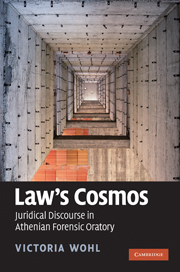Book contents
Bibliography
Published online by Cambridge University Press: 07 September 2010
- Type
- Chapter
- Information
- Law's CosmosJuridical Discourse in Athenian Forensic Oratory, pp. 317 - 344Publisher: Cambridge University PressPrint publication year: 2010



